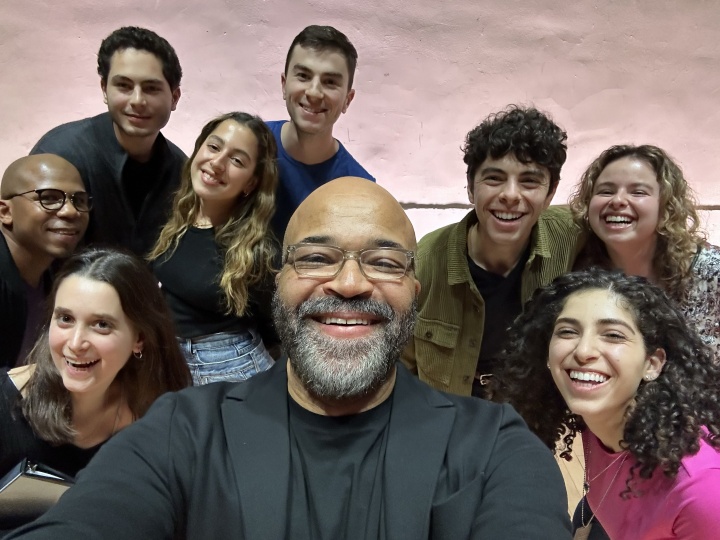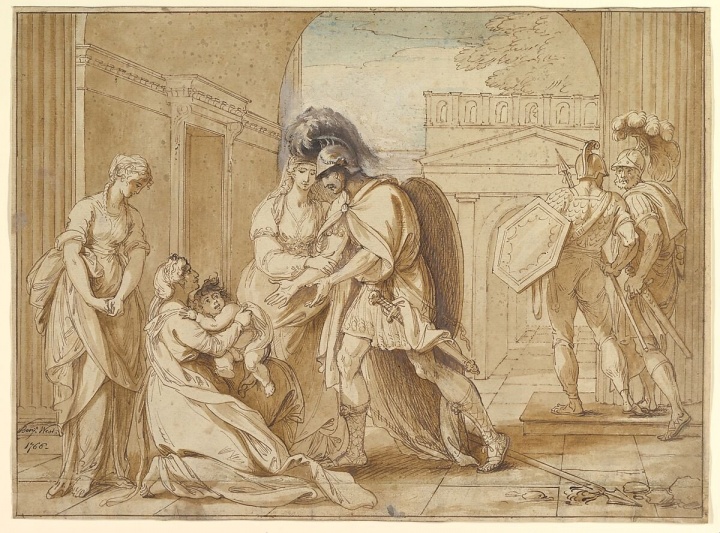An upcoming production at Miller Theatre sets the stage for community conversation.
Columbia College | Columbia University in the City of New York
This website uses cookies as well as similar tools and technologies to understand visitors’ experiences. By continuing to use this website, you consent to Columbia University’s usage of cookies and similar technologies, in accordance with the Columbia University Website Cookie Notice.
An upcoming production at Miller Theatre sets the stage for community conversation.
When theater was born in fifth-century Athens, it served not just as entertainment, but as civic ritual. Those first performances brought communities together in the Theatre of Dionysus to watch plays that examined what it meant to be human, including tragic works that considered themes of loss, war and abuse of power. Aristotle argued that these tragedies had a positive social function, arousing feelings of terror and pity that cleansed spectators’ hearts. He called the experience “catharsis.”

At the February 27 performance, 2023 Oscar nominee Jeffrey Wright took a selfie with the Columbia students who made up the Greek chorus.
Per Theater of War’s hallmark, the play will be followed by a guided, town hall-style discussion, inviting audience members to share their reactions and personal experiences. The intention is to underscore how centuries-old tragedies still resonate with contemporary audiences, but more significantly, to foster empathy and encourage healing.
Core director Larry Jackson references the atmosphere and events that occurred on campus after the acts of terrorism and violence perpetrated by Hamas on October 7. “In the Fall semester, when we saw the kind of disagreement and strife that was taking place, it was very clear to us that we had to do something,” Jackson says. “What we needed the Core Curriculum to do was create a space for community, to hold the Columbia campus together — not through consensus, but so that we can learn to coexist and learn to engage in civil discussion and to disagree, respectfully.”
The challenge, Jackson continues, was finding a way to have these conversations amid so much pain and discord: “We asked ourselves, ‘How can we provide a space to help people work through their traumas, recognize the humanity of people that they disagree with and find ways to coexist with people who don’t think like them?’”
Jackson’s colleague Clémence Boulouque, the Carl and Bernice Witten Associate Professor of Jewish and Israel Studies, especially felt the urgency. “I was going through an existential crisis, seeing both sides on campus not talking to one another, or even worse,” she says. Rather than lecturing her students about the conflict, as a longtime Lit Hum instructor, she wanted them to consider how the texts they were studying might help them cope with their distress.
While preparing for a panel about the role of the humanities in times of crisis, Boulouque recalled a Theater of War production she had seen on campus in 2019. “I was blown away by that performance,” she says. “I reached out to Larry and told him, ‘We need to bring them back.’ This was a way we could create some dialogue, and remind people that we are all human beings, and that others are hurting and suffering.”

Hector taking leave of Andromache: the Fright of Astyanax; a 1766 drawing by Benjamin West.
The show’s other selection, from Euripides’ The Trojan Women, continues the tragic saga: Following Hector’s death and the ultimate fall of Troy, the Greeks fear that Astyanax will grow up to avenge his father; Odysseus throws the child from a tower. After her son is murdered, Hector’s widow, Andromache, is forced to become a concubine.
It’s heavy content, and Jackson says that is precisely the point. “We have to acknowledge the awful tragedy of the death of children, of sexual violence, in war,” he says. “We’re providing a space for people on different sides of this issue to recognize the horrors that are playing out still, to think about their own responses to that and to process the emotional weight of it. So it’s going to be deep, it’s going to be intense, it’s going to be real.”
Boulouque concurs. “Theater’s mission initially was to be a place where citizens came together,” she says. “And we are sorely lacking that connective tissue right now.”
Doerries co-founded Theater of War Productions in 2009; as a classics major at Kenyon, he started directing his own translations of Greek plays in his senior year. “After that I started searching for audiences for whom Greek tragedy might feel like kitchen-sink realism, and that led me out of the academy and into hospitals,” he says. “And that led to the military and veterans, and that led to prisons.”
Theater of War currently has 35 projects that address pressing issues of public health and social justice, performed in communities in conflict nationwide; the post-play discussions that are integral to the company arise from their core belief that audience members who have lived the experiences being described have the most to teach us.
Doerries expects the shows at Miller Theatre to be uncomfortable for many audience members, but he says that’s maybe not such a bad thing. “In order to have ethical conversations, we have to be engaged with our emotions,” he says.
“The objective is to create the conditions where even if we don’t agree, even if this doesn’t end with a group hug, that maybe, for a fleeting moment, we can acknowledge that we’re talking about the suffering of civilians and children,” Doerries continues. “And we can hear each other’s tragedies, reflected through our individual interpretations of the story, and by bringing individuals with lived and direct experience with war into the chorus. The currency of this discussion is proximity.”
Hector, Andromache, and the Death of Astyanax is also part of the Undergraduate Community Initiative, a joint effort among the College, Columbia Engineering and Columbia General Studies, which focuses on strengthening students’ understanding of and commitment to deep listening, respectful debate and social engagement. The initiative kicked off in January with an event honoring the legacy of Martin Luther King Jr.
“This [Miller Theatre event] really speaks to the question posed by Dr. King, which is ‘chaos or community?’” Jackson says. “If we choose community, we have to think very carefully about what that means. Community can’t mean consensus. It has to mean creating a space for having competing views and different opinions, welcoming a variety of identities and experiences, and finding a way to move forward with that diversity and that disagreement without trying to simply erase it.”
Jackson, Boulouque and Doerries all agree that bringing the campus community together — and offering an opportunity for catharsis through storytelling — illustrates the fundamental value of the humanities. “Part of what we’re doing here is defending the humanities, through practice,” Jackson says.
“We want the humanities to be engaged with the experiences of people in their everyday lives, their problems, their cares, their concerns. And I think this is a great way of showing how the humanities can do just that — that it can provide a space for civil discussion, for respectful disagreement, for processing our feelings and perspectives, and for mourning together.”
Register online for the February 26 evening and February 27 matinee performances of Hector, Andromache, and the Death of Astyanax. Admission is free.

Published three times a year by Columbia College for alumni, students, faculty, parents and friends.
Columbia Alumni Center
622 W. 113th St., MC 4530, 6th Fl.
New York, NY 10025
212-851-7852
cct@columbia.edu

Columbia Alumni Center
622 W. 113th St., MC 4530, 4th Fl.
New York, NY 10025
212-851-7488
ccalumni@columbia.edu